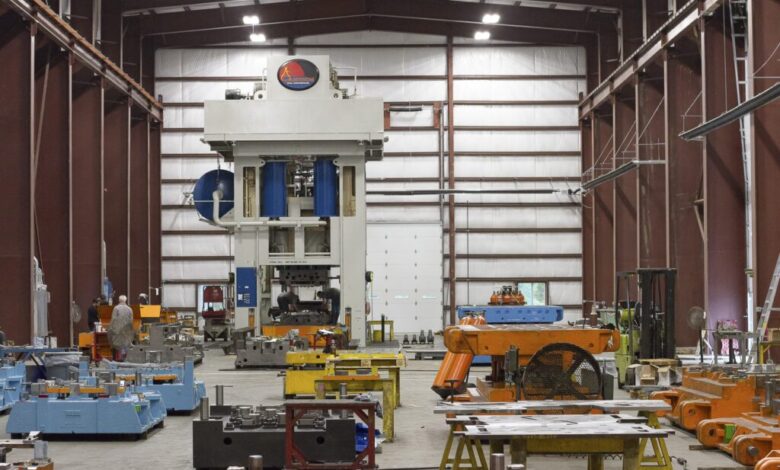How Michigan’s Industrial Tool Manufacturers Are Adapting to the Smart Factory Revolution

The world of manufacturing is undergoing a significant transformation, with industries across the globe embracing what is known as the Smart Factory Revolution. In Michigan, a state with a long history of industrial innovation, manufacturers of industrial tools are at the forefront of this transformation. By integrating cutting-edge technologies such as Internet of Things (IoT) sensors, automation, and data-driven solutions, Michigan-based companies are reshaping their products and processes to keep up with the increasing demands for efficiency and precision.
The Smart Factory Revolution
The smart factory revolution refers to the next wave of manufacturing where automation, data exchange, and real-time information drive productivity and efficiency. This era is characterized by the use of IoT sensors, machine learning, artificial intelligence (AI), and robotics to create factories that can operate autonomously, monitor performance, and make data-driven decisions without human intervention.
In such a factory, every machine, tool, and piece of equipment is connected to a central system, enabling manufacturers to gather real-time data about machine performance, tool condition, and production progress. This allows for predictive maintenance, process optimization, and quicker decision-making.
How Michigan Industrial Tool Manufacturers Are Embracing Smart Technology
1. Integrating IoT Sensors into Industrial Tools
One of the most important technological innovations that Michigan industrial tool manufacturers are incorporating into their products is the Internet of Things (IoT). IoT sensors are small devices that can be installed into machines and tools to collect data on various parameters such as temperature, vibration, speed, and pressure. These sensors provide manufacturers with valuable insights into the performance of tools and machines in real time.
Automation plays a crucial role in the smart factory landscape. By automating repetitive tasks, manufacturers can drastically reduce human error, improve production speed, and lower labor costs. Michigan’s industrial tool manufacturers are integrating automation into their products, allowing for more precise and efficient tool usage.
2. Data-Driven Insights for Process Optimization
Data is at the heart of the smart factory revolution. With the integration of IoT and automation, Michigan industrial tool manufacturers are creating products that enable real-time data collection and analysis. These data-driven insights can be used to optimize manufacturing processes, reduce waste, and improve resource management.
For example, by analyzing the data collected from IoT sensors, manufacturers can identify inefficiencies in the production line. If certain tools are causing bottlenecks, adjustments can be made in real time to address these issues. Similarly, data analysis can be used to improve supply chain management by predicting demand for specific tools and materials.
3. Cybersecurity: Ensuring Safe Smart Tools
As industrial tools become smarter and more connected, the importance of cybersecurity grows. IoT devices and automation systems generate vast amounts of data, which could become targets for cyber-attacks if not properly protected. To ensure the safety and integrity of their products, Michigan industrial tools manufacturers are investing in advanced cybersecurity measures.
Security protocols such as encryption, firewalls, and secure communication networks are being integrated into the design of smart tools and equipment. This ensures that any data exchanged between machines, sensors, and control systems remains secure and prevents unauthorized access.
4. Collaboration with Industry Leaders
Michigan’s industrial tool manufacturers are not working in isolation. Many are collaborating with technology companies and research institutions to drive innovation in smart manufacturing. By partnering with IoT specialists, automation providers, and data analytics experts, they are gaining access to the latest technologies and best practices.
These collaborations are essential in helping Michigan manufacturers stay ahead of the curve in an increasingly digital world. Through joint ventures and partnerships, they are developing new solutions and enhancing the capabilities of their products to meet the evolving needs of the smart factory environment.
The Future of Michigan Industrial Tools in the Smart Factory Landscape
Looking ahead, the future of Michigan Industrial Tools is bright. As the smart factory revolution continues to evolve, these manufacturers will play an integral role in shaping the future of manufacturing. The ongoing integration of IoT, automation, and data analytics will lead to smarter, more efficient factories that are capable of self-optimizing and operating autonomously.
By staying at the cutting edge of these technological advancements, Michigan’s industrial tool manufacturers will not only remain competitive but will continue to lead the way in innovation, driving the growth of both local and global manufacturing industries.
Conclusion
The integration of smart technologies such as IoT sensors, automation, and data-driven insights into Michigan’s industrial tools is revolutionizing the way factories operate. By embracing the smart factory revolution, these manufacturers are helping businesses enhance efficiency, reduce downtime, and increase productivity. As the world of manufacturing continues to evolve, Michigan’s industrial tool manufacturers are well-positioned to remain leaders in this transformation.
As manufacturers continue to innovate and adapt to these technological advancements, Michigan’s industrial tools will undoubtedly continue to play a vital role in shaping the future of the manufacturing industry.
FAQs
1. How are Michigan industrial tool manufacturers integrating IoT into their products?
Michigan industrial tool manufacturers are integrating IoT sensors into their products to collect real-time data on machine performance, such as temperature, pressure, and vibration.
2. What role does automation play in Michigan industrial tool manufacturing?
Automation in Michigan’s industrial tool manufacturing helps reduce human error, increase production speed, and enhance product consistency. Automation allows machines to adjust settings automatically based on real-time data, improving the overall efficiency of the manufacturing process.
3. How can data analytics improve manufacturing processes?
Data analytics helps Michigan Industrial Tools manufacturers optimize production by identifying inefficiencies, predicting tool wear, and managing resources more effectively.
4. What cybersecurity measures are being taken by Michigan industrial tool manufacturers?
To protect smart tools and data, Michigan industrial tool manufacturers are implementing advanced cybersecurity protocols such as encryption, firewalls, and secure communication networks.




